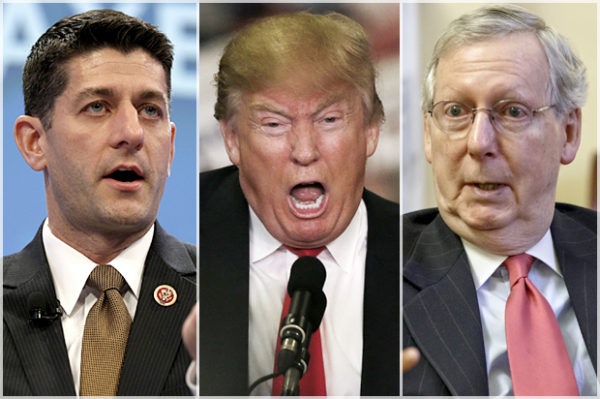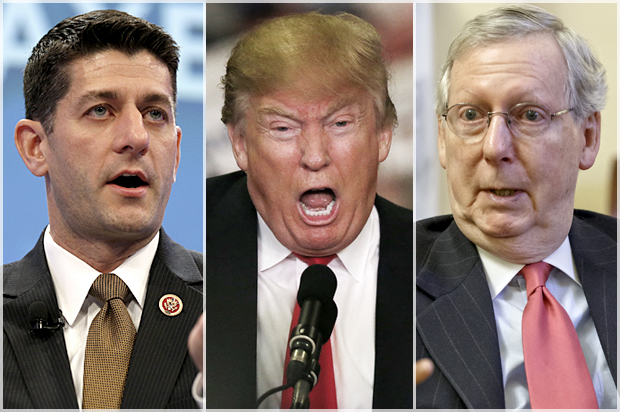
Paul Ryan, Donald Trump, Mitch McConnell (Credit: AP/Reuters/Kevin Lamarque/Brynn Anderson/J. Scott Applewhite)
“Great president. Most people don’t even know he was a Republican,”
-Donald Trump [1]
When Donald Trump came down the escalator in June 2015 and announced his candidacy for president, it was easy to blow him off as a joke candidate. Although running as a Republican, Mr. Trump’s campaign up-ended many establishment Republican orthodoxies. At various points during his campaign, Trump suggested raising taxes on the wealthy [2], suggested President George W. Bush did not keep America safe during 9/11 [3], argued for the need of healthcare that covered everyone, [4] called for a massive border wall to end mass migration [5], and claimed Bush lied about the presence of WMD in Iraq. [6]
Campaigning on an unabashed “America First” platform, candidate Donald Trump’s brand of conservative populism combined populist economic rhetoric with xenophobic speech regarding Muslims, Latinos, African Americans and other minorities. Despite abandoning GOP orthodoxy on certain economic issues and humiliating many “establishment” Republicans during his campaign, Trump managed to capture the GOP base and even expand it to include some Obama voters. While many in the conservative intelligentsia like Bill Kristol, Ana Navarro and Michael Steele denounced Trump or his rhetoric, most Republican politicians supported his candidacy.
This brings us to our political vendetta: Party v. Country. President Donald Trump was elected by a majority of Republican voters to be the party’s nominee for the presidency in 2016. As such, the fate of the Republican Party is tethered to his. Although Trump has been willing to sign orthodox Republican legislation (often reversing his own campaign promises), his personal scandals, administration scandals, and temperament have become a dark cloud on his presidency. Republicans like Senator Ben Sasse (NE) [7] and Representative Justin Amash (MI-03)[8] understand this and represent one side of the vendetta facing Republicans: do they stick with an unpopular, scandal-plagued president to pass their agenda or do they begin scattering and undermine their own party’s hold on power? As the months have passed, different forces have been pulling on Republicans to try to reestablish some semblance of normalcy in Washington. Despite warnings from prominent conservative pundits against putting “party over country,” polling among Republicans continues to show strong support for the president. [9] For the most part, congressional Republicans are largely sticking with Trump despite the contentious town halls, marches and “resistance” from liberals and moderates.
Republicans still calculate that they can pass their agenda and ditch Trump before the baggage gets too heavy for them. On one hand, there are many upsides to sticking with Trump:
- His popularity among Republicans means that supporting the President is the safest way to prevent a costly primary challenge in their own elections
- There is little to gain from being a Republican against Trump because Democrats will not reward GOP defectors with their votes
- As long as congressional leaders stand by Trump, the rank-and-file members can be rewarded for loyalty with seats on committees or bills being brought up for debate.
However, sticking with the President has also proven difficult for congressional Republicans. Not only has their support for the president injured their public persona, but the administration’s combative tone and heavy-handed approach to legislating has made it harder for Republicans to pass their agenda. The repeal of Obamacare was supposed to be easy after seven years of promises, but the administration’s lack of focus, combined with the institutional norms violated in the process of writing the bill doomed repeal in the Senate. Moreover, the administration’s repeated insults towards Senator John McCain, and the alleged attempt at threatening jobs in Alaska over Sen. Murkowski’s (R-AK) healthcare vote[10] alienated many senators.
Following the failure of Obamacare repeal, Senate Republicans have begun to break from the President, and not just semi-vulnerable Republicans like Jeff Flake of Arizona. Unlike House members, Senators have less to worry because fewer are up for election in 2018. This has allowed them to tie the President’s hands on the Russia sanctions bill, passing it with veto-proof majorities in both houses. Additionally, two bipartisan bills, one from Senators Lindsay Graham (R-SC) and Corey Booker (D-NJ) and the other from Thom Tillis (R-NC) and Chris Coons (D-DE), would make it harder for the President to fire special prosecutor Bob Mueller without cause. The Graham-Booker bill would require a judges panel to review any order to fire Mueller, while the Tillis-Coons bill would allow Mueller to appeal any firing to a judges panel. The four senators intend to merge the bills when congress reconvenes in September. [11]
WHAT WE CAN DO:
That is where we the people must step in. The Trump administration’s heavy- handed and self-defeating political activity, off-putting rhetoric, and air of corruption have tainted the GOP. The Republican Party has long been known to be strong on defense and fiscally conservative; they risk that reputation on a President under criminal investigation for obstruction of justice in the Russia investigation [12], who has alienated allies [13], and is violating the norms of American civil society.
This is something that all Americans need to do, liberal or conservative. If the United States is to prevent the damage the President is doing to its standing in the world, we have to demand better of our Republican representatives. Congressional Republicans need to learn that we will not sit idly by and watch them let the President run roughshod over American values, alliances, and national security just to make sure there is an R at Pennsylvania Avenue. With congress on its August recess and the fight over health care tabled, we need to stand together and attend local town halls to demand that congress take action to protect Bob Mueller.
This is the first test for Republicans, who allowed the rise of Trump through decades of pandering to the worst instincts of their base. Passing legislation to protect Bob Mueller won’t break the fever instantly, but it is the first step. Otherwise, as former Chief of Staff to John McCain, Mark Salter, tweeted “the security of the United States might now depend on electing a Democratic congress in 2018”. [14]




